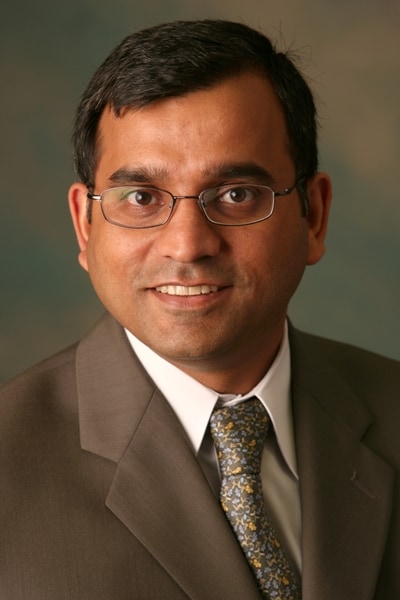
Time is brain: Recognizing stroke symptoms fast increases chances of survival
Jessica Brewer, LMH Health
According to the Centers for Disease Control (CDC), someone in the United States has a stroke every 40 seconds. Dr. Sanjeeev Kumar, a neurologist at Lawrence Neurology Specialists, says that approximately 800,000 people in the United States have a stroke every year.
“Stroke is not only the fifth leading cause of death in the United States, but it is the leading cause of serious long-term disability,” he said. “It leaves about half of survivors with a moderate to severe disability.”

Dr. Sanjeev Kumar
May is recognized as Stroke Awareness Month. This month, we wanted to congratulate the LMH Health stroke program for making the Gold Plus Stroke Honor Roll again in 2019. May is not only a time to recognize the hard work of this program, but to spread knowledge on stroke awareness.
We want to bring light to the importance of recognizing the symptoms of a stroke and instill in the minds of the community to BE FAST – Balance, Eyes, Face, Arms, Speech and Time.
“Having stroke symptoms during this time can bring worry and anxiety, not only about having a stroke but about the possible exposure to COVID-19,” said Jana Wallen, outcomes coordinator. “If you do have an emergency, such as heart attack or stroke symptoms, call 911. LMH Health has procedures in place to safely provide you treatment and care when you need it.”
LMH Health wants to continue to emphasize the importance of stroke awareness, particularly during the COVID-19 pandemic. Being aware of stroke risk factors, understanding stroke symptoms and acting quickly can save lives. Stroke warning signs include sudden numbness or weakness of your face, arm or leg, especially on one side of your body; sudden confusion, trouble speaking or understanding; sudden trouble seeing in one or both eyes; sudden trouble walking, dizziness, loss of balance or coordination; and sudden severe headache with no known cause.
Dr. Kumar said that across the country, multiple institutions have noted an increase in large vessel strokes in young, healthy patients. They have gathered that people are either not coming to the hospital or are coming very late because of COVID-19 fears.
“This is a big problem,” he said. “Remember that time is brain. People experiencing symptoms of a stroke need to seek care immediately. If they come in, we may be able to help prevent a major stroke down the line.”
How to recognize a stroke: Remember to BE FAST
Balance – Loss of balance (headache or dizziness)
Eyes – Blurred vision
Face – One side of the face is drooping
Arms – Arm or leg weakness
Speech – Speech difficulty
Time – Time to call for ambulance immediately
When every minute counts, don’t let fear stand in your way of receiving lifesaving care. Our emergency department is open and prepared to care for you safely, even during COVID-19.
Getting care as soon as possible improves your chance of survival. When an ambulance is called to take you to the emergency department, first responders are able to contact the hospital ahead of time about your symptoms. This shortens the time and allows staff to provide the extra level of care needed when dealing with something as time-sensitive as a stroke. The sooner symptoms are recognized, the sooner a stroke can be identified and can be counteracted.
Early reperfusion can be major in determining the outcome of a stroke. The benefits are stronger when the drug rTPA, which helps break down the blood clot in the brain, is given to patients within the first 90 minutes after stroke symptoms begin to the first 4.5 hours. This is the approved window, however, it performs better the earlier it is done.
“Prompt reperfusion, which restores the blood flow to your brain, is the most effective treatment for an acute ischemic stroke,” Dr. Kumar said. “LMH Health has a primary stroke unit dedicated to providing excellent stroke care. Even during COVID-19, you must get help immediately if you feel you are having a stroke.”
Having regular medical checkups can help you learn about your risk factors and what habits you should change to lower your chances of having a stroke.
“Avoiding smoking, keeping a healthy diet rich in fruits and vegetables and exercising regularly at a moderate to vigorous level are just a few things that can potentially decrease the likeliness of a stroke,” Dr. Kumar said. “Regular blood pressure screening is critical and maintaining a blood pressure below 130/80 should be your goal. If you do have a stroke, living a healthy lifestyle can often help you to recover better.”
Though COVID-19 is an active and ongoing concern, your health is the most important to us. Do not delay care because of fear of contracting the virus. We are here for you when you need us most and encourage you to come to LMH Health when you need emergency care.
“It’s a very scary time right now but rest assured, LMH Health is doing everything we can to keep patients and staff safe,” Wallen said. “Symptoms and signs of a stroke can be very serious and we want to communicate the urgency of always calling 911 and getting to the hospital fast. Time lost is brain lost.”
Dr. Kumar agreed that prompt action is very important.
“We are ready at LMH Health,” he said. “Seek immediate medical care. We can promise on our end that we are following all CDC guidelines and are working to ensure the best care for those stricken with COVID-19 and it’s complications including stroke.”
Jessica Brewer is the social media and digital communications specialist at LMH Health.